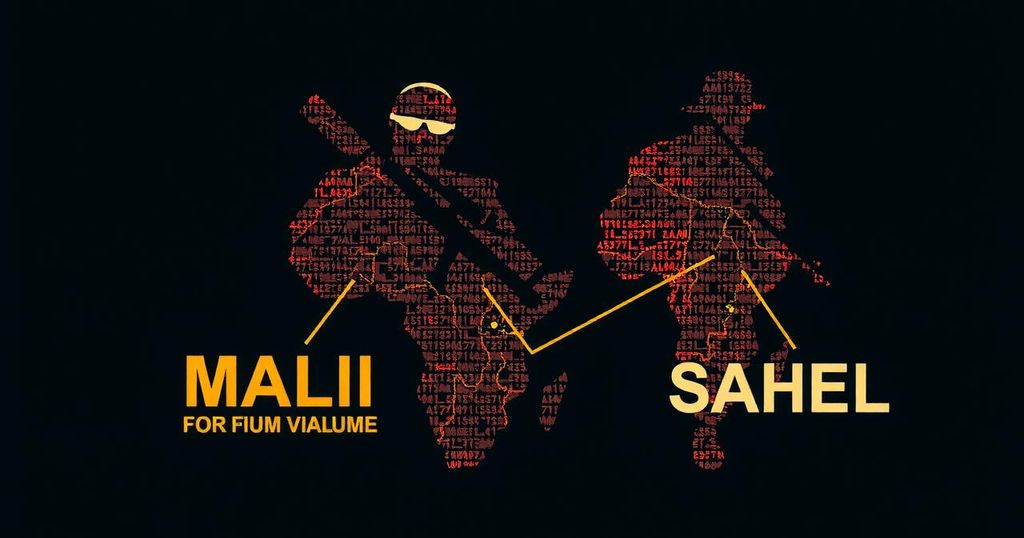The Escalating Jihadist Threat in Mali: Insights from the Bamako Attack
The attack on Bamako by the Group for the Support of Islam and Muslims (GAIM) underscores the intensifying jihadist threat in Mali and the Sahel. Despite Mali’s military claims of control, the reality reflects severe operational capabilities among jihadist groups and significant failures within Mali’s security services. The incident raises alarms for neighboring nations and illustrates the region’s ongoing instability, as Mali continues to struggle under the weight of insurgencies while distancing itself from Western alliances.
The recent assault on military facilities in Bamako by the Group for the Support of Islam and Muslims (GAIM), which is affiliated with al-Qaeda, signifies a considerable setback for Mali’s military regime. This incident underscores the escalating jihadist threat within the Sahel region and further exacerbates existing instability. The attack on police barracks and a military airport occurs at a time when the Malian army, along with Russian military partners, including Wagner Group mercenaries, is attempting to re-establish control over various areas of Northern Mali. Despite the ruling military junta’s claims that it maintains oversight of the situation, the proliferation of al-Qaeda and Daesh-associated jihadist factions over the years raises grave concerns. Lucas Weber, an analyst from Technology Against Terrorism, remarked that the nature and location of the recent attack indicate “the high operational capabilities of the Islamist and Muslim Support Group and the extent of its spread.” He further emphasized that this incident reflects significant deficiencies within Mali’s intelligence and security apparatus, as well as those of their Russian and regional allies, in preemptively thwarting such attacks. This incident necessitates caution for neighboring nations, as the jihadist group may replicate similar operations outside of Mali. The Malian military leadership has initiated extensive operations in the northern territories, which have experienced losses of various regions due to armed separatists and jihadists. Though significant military operations were launched, a notable defeat occurred in July, wherein the Malian army suffered considerable human losses, especially near the Algerian border. Wagner Group sources echoed these claims, confirming their casualties. On a contrary note, Tuareg separatists celebrated a notable victory, alleging that they had caused substantial Russian military casualties, claiming the lives of fifty Russians and ten Malians. Historically, the threat in northern Mali was managed by the French Barkhane force and the UN’s MINUSMA, along with European forces until their expulsion by the military junta, which opted to seek Russian support instead. Since this shift, Malian military successes have dwindled, and accusations against Russian mercenaries for human rights violations have proliferated. Recently, the attack signifies the jihadists’ advancing southward, with their ambitions to reach the Gulf of Guinea. For these terrorist organizations, Northern Mali serves as a sanctuary and operational base as they strategize their southern offensives. Mali, alongside neighboring Niger and Burkina Faso, continues to struggle against this escalating threat. The current stance of Western countries is viewed with skepticism by the Malian authorities; consequently, Western powers cannot gather intelligence or implement measures to counteract the jihadist surge effectively. The ramifications of Sahelian terrorism extend beyond regional borders, posing risks to European stability as well. The recent trend of Malian governance, characterized by isolation from Western nations and the decision to withdraw from the Economic Community of West African States (Ecowas), in favor of establishing the Alliance of Sahel States (AES) with ties to Russia, raises international alarms.
The Sahel region, particularly Mali, has faced a deteriorating security situation characterized by the rise of jihadist groups, primarily linked to al-Qaeda and Daesh. Following two military coups in 2020 and 2021, Mali’s military regime has increasingly relied on Russian support, notably through the Wagner Group, to combat growing insurgencies. Historically, the region was secured by foreign forces, including France’s Barkhane mission. However, the expulsion of these forces has led to intensified jihadist activities, threatening to destabilize not only Mali but neighboring states as well. The attacks by jihadist groups have illuminated significant gaps in intelligence and security capabilities, exacerbating the sense of vulnerability within these nations.
The recent attacks in Bamako affirm the severe jihadist menace confronting Mali and the broader Sahel region, highlighting the inadequacies of local security forces and the challenges of counterterrorism efforts. The shift towards reliance on Russian military support has not yielded a decisive victory against the insurgents; instead, it has led to further instability and rising casualties. The implications of these developments resonate beyond Mali, presenting potential challenges for the entire Sahel region and European nations as well, necessitating a recalibration of strategies to address this escalating threat.
Original Source: www.atalayar.com








Post Comment